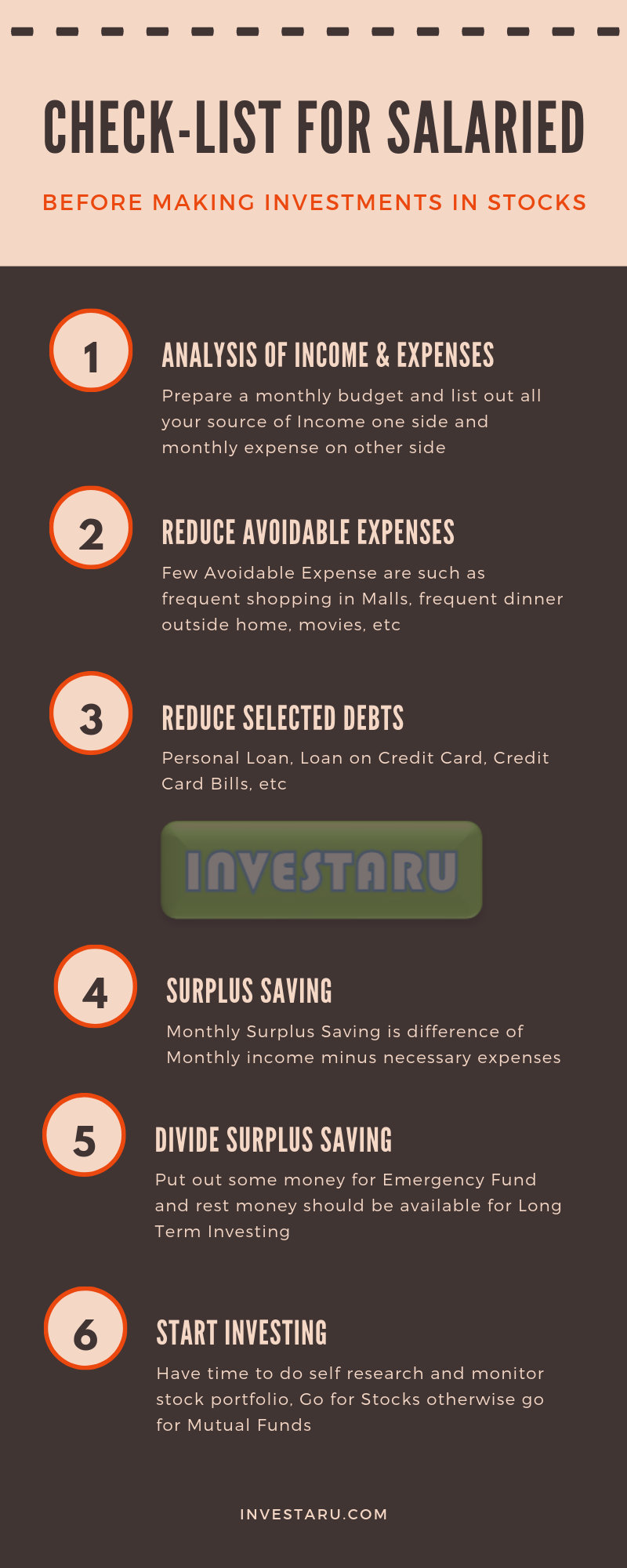How Salaried Person can manage to Invest in Stocks?
Are you a salaried person? Want to Invest in Stock Market? This article is for you so keep reading.
We will guide you in simple language Steps a salaried person should take before investing in Stock Market.
One of the biggest issue with our salaried class is that they have limited salary to fulfill their unlimited dreams
When Interest rates on FDs are falling, salaried class is also looking for other opportunities to invest their hard earned money.
There are different options available other than bank fixed deposits such as Gold, Real estate, PPF, Govt Bonds, Stocks, etc.
Generally, returns from Stock Market outperform all other options in long run.
Now, before you start investing in Stocks you need to work upon few steps.
We will discuss basic steps you should take to manage your own fund before investing.
Investing in Stock Market is a very critical decision. We want you to be fully prepared before you take this decision
Steps to take before making decision to Invest in Stock Market

#1 Analyse Income & Expenses
The very first step you should do before starting your investment journey is to identify your monthly source of income and monthly expenses.
In simple words, from where you are getting money for example monthly salary or any other source of income and where you are spending your money for example monthly household expense, EMIs, electricity bills, phone bill, travelling expenses, rental expense (if any), shopping, etc.
If you don’t have any other source of income, we can understand, it would be very difficult to save money from your monthly income. So, in next few points we will discuss how can you boost your saving with limited income
Also read: Top 10 Reasons Why You Should Save Money
#2 Reduce Avoidable Expenses
When you list out your income and expenses. Focus on your monthly expenses side as income is fixed and you are managing all your necessary and avoidable expenses out of this fixed income.
Necessary expense such as households expense (buying kitchen items etc.) or paying EMIs or bills are unavoidable.
In your list of expense, you will find few expenses that can easily be reduced or can be avoided on monthly basis by reducing the occurrence of event, such as going for dinner outside, shopping without need, frequent visit to multiplex for movies or unnecessary travelling.
We are not asking you to compromise with your lifestyle and dreams but if you could reduce some avoidable expense it will be a booster to your saving.
#3 Reduced Selective Debts
There is no point in saving and investing if you have outstanding credit card bills, or have taken personal loans on high interest rate.

It is highly advisable to close your credit card bills or personal loan through lumpsum payment out of your saving first. It will also help in reducing your monthly EMI pressure.
#4 Calculate Surplus Saving
Now, you have got enough idea how you are going to reduce your expenses. It’s time to calculate your total monthly saving. This figure of Surplus Saving is very important. You are going to optimize this amount through your investment.
So, to calculate monthly surplus saving, simply minus your monthly expenses from your monthly income.
#5 Divide Surplus Saving
Before you invest your monthly saving, we suggest you to please divide monthly saving into two parts. First part should be for maintaining Emergency Fund and second part for Investments.
Many of us ignore the Importance of Emergency Fund and in case of emergency we go for pre-mature withdrawal of our investments which we have planned for some other goals.
Due to this pre-mature withdrawal, if Market conditions are not in your favor you might book losses on your investment made in stocks and mutual funds.
After achieving a good corpus in your emergency fund you can stop your monthly transfer to emergency fund and use that amount too for investment purpose.
Also read: Why Emergency Fund is must for a Salaried Class
#6 Start Investing
Now with surplus saving and after maintaining Emergency Fund, you are ready to invest in Stock Market.
If you have enough time and want to manage your Stock Market Investment by yourself, you can directly invest in stocks.

Also read : Step by Step guide for Start Investing in Stock Market
But, if you don’t have time and don’t want to manage your investment in stocks by yourself, you should go for Mutual Funds. Mutual Fund investing through SIP is right approach for those who don’t have much time or much knowledge about Stock Market.
Also read: Understand SIP : Systematic Investment Plan – Step toward wealth creation
Conclusion:
It is true that return from Stock Market outperform other options of investment, but it is also true that Stock Market carries risk. So, make your mind, follow these above steps and ready to put efforts & time before investing. You should always invest that money in stocks or mutual funds, which you are not in need in near future.
If you still have any query comment below. We will help you in your Investing Journey.
Also read
All about Mutual Fund – Smart way of Investing
Step-By-Step Guide to Open Demat account with Zerodha in less than 15 minutes
How to build a Stock Portfolio – Stock Market for Beginners

